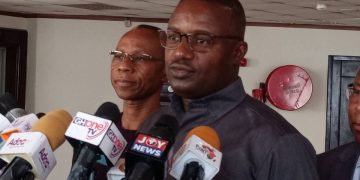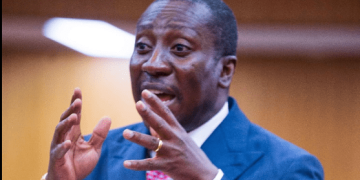The Minister for Energy and Green Transition, Mr. John Abdulai Jinapor, has reaffirmed his commitment to retrieving the missing Electricity Company of Ghana (ECG) containers and ensuring that procured electrical cables are put to use while leaving prosecution of any wrongdoing to the Attorney-General, Dr. Dominic Ayine.
Mr. Jinapor made these remarks when he appeared before the Parliamentary Committee on Mines and Energy on Monday to provide updates on the status of the missing containers and measures taken to prevent similar occurrences.
“My focus is to recover the containers and make use of the cables. On prosecution, that is entirely within the remit of the Attorney-General. I have submitted the reports to his office, and he has opted to carry out further investigations to build a solid case,” the Minister told the committee.
Mr. Jinapor was firm in his stance on administrative accountability but insisted that due process must be followed.
“If preliminary investigations reveal culpability, then people can be interdicted or asked to step aside. That has already begun. But I believe in allowing people fair hearing before judgment,” he said.
He added that the Ministry is working closely with the Chief of Staff’s office, the Ghana Ports and Harbours Authority (GPHA), and the Customs Division of the Ghana Revenue Authority to ensure a lawful and transparent clearance of the remaining containers.
“We are being meticulous. We will not do anything illegal or outside due process. I do not want to be accused tomorrow of the same offense,” the Minister affirmed.
The Minister disclosed that more than 2,000 out of over 3,000 initially reported missing containers have now been traced, thanks to collaborative efforts with port authorities and internal audits.
Mr. Jinapor noted that in the past, suppliers would ship goods, and ECG would bear the responsibility of clearing them— a practice he said led to accountability challenges. The new directive now mandates suppliers to deliver goods directly to ECG warehouses before payments are made.
“It surprises me that in some instances, companies were contracted, and ECG was made to clear the containers. That should not be the case. Standard practice is that the product must be delivered to our warehouse before we pay,” he added.
The Minister indicated that the container scandal has prompted far-reaching reforms in ECG’s procurement structure.
The Ministry, he said, has decoupled the procurement unit and brought in qualified experts to manage it while all procurements must now pass through the Public Procurement Authority, and ECG must report quarterly to the ministry on its procurement activities.
He also revealed a staggering over-expenditure in ECG’s procurement over the last two years.
“In 2023, ECG planned to procure items worth GH¢935 million, but they procured GH¢8.3 billion— a deviation of over GH¢7.3 billion. In 2024, they planned GH¢1.3 billion and ended up procuring GH¢8.2 billion. That’s an unbudgeted deviation of GH¢6.8 billion. In total, ECG has overspent by over GH¢14 billion,” he disclosed.
Mr. Jinapor expressed disappointment that many of the contracts were approved without board oversight and were denominated in US dollars, exposing ECG to exchange rate risks.
“Most of these contracts were awarded without board approval. That is unacceptable. And because they were dollar-denominated, the depreciating cedi has made the situation worse,” he said.
He assured the Committee that the current ECG Managing Director is complying with the new directives and that the Ministry has tasked the ECG board to closely monitor all procurement activities moving forward.
“I have only one objective: locate the containers and make use of them, and ensure those responsible are held accountable. We must also fix the procurement process internally,” he stressed.



















































































